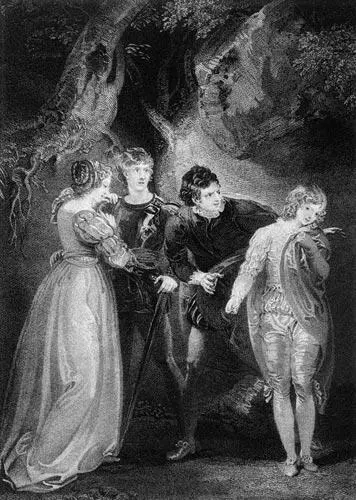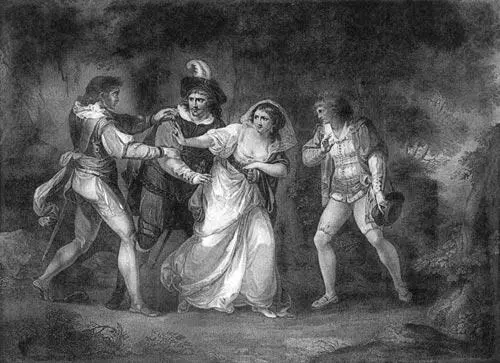Val. Why, boy! why, wag! how now? what’s the matter? Look up; speak.
Jul. O good sir, my master charg’d me to deliver a ring to Madam Silvia, which (out of my neglect) was never done.
Pro.
Where is that ring, boy?
Jul.
Here ’tis; this is it.
[Shows a ring.]
Pro.
How? let me see.
Why, this is the ring I gave to Julia.
Jul.
O, cry you mercy, sir, I have mistook;
This is the ring you sent to Silvia.
[Shows another ring.]
Pro.
But how cam’st thou by this ring? At my depart
I gave this unto Julia.
Jul.
And Julia herself did give it me,
And Julia herself hath brought it hither.
Pro.
How? Julia?
Jul.
Behold her that gave aim to all thy oaths,
And entertain’d ’em deeply in her heart.
How oft hast thou with perjury cleft the root?
O Proteus, let this habit make thee blush!
Be thou asham’d that I have took upon me
Such an immodest raiment—if shame live
In a disguise of love!
It is the lesser blot, modesty finds,
Women to change their shapes than men their minds.
Pro.
Than men their minds? ’tis true. O heaven, were man
But constant, he were perfect; that one error
Fills him with faults; makes him run through all th’ sins:
Inconstancy falls off ere it begins.
What is in Silvia’s face, but I may spy
More fresh in Julia’s with a constant eye?
Val.
Come, come, a hand from either.
Let me be blest to make this happy close;
’Twere pity two such friends should be long foes.
Pro.
Bear witness, heaven, I have my wish for ever.
Jul.
And I mine.
[Enter] Duke, Thurio, Outlaws.
Outlaws.
A prize, a prize, a prize!
Val.
Forbear, forbear, I say; it is my lord the Duke.
Your Grace is welcome to a man disgrac’d,
Banished Valentine.
Duke.
Sir Valentine!
Thu.
Yonder is Silvia; and Silvia’s mine.
Val.
Thurio, give back, or else embrace thy death;
Come not within the measure of my wrath.
Do not name Silvia thine; if once again,
[Milan] shall not hold thee. Here she stands,
Take but possession of her with a touch:
I dare thee but to breathe upon my love.
Thu.
Sir Valentine, I care not for her, I;
I hold him but a fool that will endanger
His body for a girl that loves him not.
I claim her not, and therefore she is thine.
Duke.
The more degenerate and base art thou
To make such means for her as thou hast done,
And leave her on such slight conditions.
Now, by the honor of my ancestry,
I do applaud thy spirit, Valentine,
And think thee worthy of an empress’ love.
Know then, I here forget all former griefs,
Cancel all grudge, repeal thee home again,
Plead a new state in thy unrivall’d merit,
To which I thus subscribe: Sir Valentine,
Thou art a gentleman and well deriv’d,
Take thou thy Silvia, for thou hast deserv’d her.
Val.
I thank your Grace; the gift hath made me happy.
I now beseech you (for your daughter’s sake)
To grant one boon that I shall ask of you.
Duke.
I grant it (for thine own) what e’er it be.
Val.
These banish’d men, that I have kept withal,
Are men endu’d with worthy qualities.
Forgive them what they have committed here,
And let them be recall’d from their exile;
They are reformed, civil, full of good,
And fit for great employment, worthy lord.
Duke.
Thou hast prevail’d, I pardon them and thee;
Dispose of them as thou know’st their deserts.
Come, let us go, we will include all jars
With triumphs, mirth, and rare solemnity.
Val.
And as we walk along, I dare be bold
With our discourse to make your Grace to smile.
What think you of this page, my lord?
Duke.
I think the boy hath grace in him; he blushes.
Val.
I warrant you, my lord—more grace than boy.
Duke.
What mean you by that saying?
Val.
Please you, I’ll tell you as we pass along,
That you will wonder what hath fortuned.
Come, Proteus, ’tis your penance but to hear
The story of your loves discovered;
That done, our day of marriage shall be yours,
One feast, one house, one mutual happiness.
Exeunt.
¶
 Thomas Stothard , p. — John Ogborne , e.
Thomas Stothard , p. — John Ogborne , e.
 Angelica Kauffman , p. — Luigi Schiavonetti , e.
Angelica Kauffman , p. — Luigi Schiavonetti , e.
William Shakespeare
( 1594–1595 )
Quarto, 1598; First Folio, 1623.
lost
¶
Act I
Sc. I Sc. II
Act II
Sc. I
Act III
Sc. I
Act IV
Sc. I Sc. II Sc. III
Act V
Sc. I Sc. II
[Dramatis Personae
Ferdinand , King of Navarre
Berowne ,
Longaville ,
Dumaine , lords attending on the King
Boyet ,
Marcade , lords attending on the Princess of France
–––––
Don Adriano de Armado , a fantastical Spaniard
Sir Nathaniel , a curate
Holofernes , a schoolmaster
Dull , a constable
–––––
Costard , a clown
Moth , page to Armado
Forester
–––––
The Princess of France
Rosaline ,
Maria ,
Katherine , ladies attending on the Princess
Jaquenetta , a country wench
–––––
Lords, Attendants, etc.
Scene: Navarre ]
Enter Ferdinand, King of Navarre, Berowne, Longaville, and Dumaine.
King.
Let fame, that all hunt after in their lives,
Live regist’red upon our brazen tombs,
And then grace us in the disgrace of death;
When spite of cormorant devouring Time,
Th’ endeavor of this present breath may buy
That honor which shall bate his scythe’s keen edge,
And make us heirs of all eternity.
Therefore, brave conquerors—for so you are,
That war against your own affections
And the huge army of the world’s desires—
Our late edict shall strongly stand in force:
Navarre shall be the wonder of the world;
Our court shall be a little academe,
Still and contemplative in living art.
You three, Berowne, Dumaine, and Longaville,
Have sworn for three years’ term to live with me,
My fellow scholars, and to keep those statutes
That are recorded in this schedule here.
Your oaths are pass’d, and now subscribe your names,
That his own hand may strike his honor down
That violates the smallest branch herein.
If you are arm’d to do, as sworn to do,
Subscribe to your deep oaths, and keep it too.
Long.
I am resolved, ’tis but a three years’ fast:
Читать дальше

 Thomas Stothard , p. — John Ogborne , e.
Thomas Stothard , p. — John Ogborne , e. Angelica Kauffman , p. — Luigi Schiavonetti , e.
Angelica Kauffman , p. — Luigi Schiavonetti , e.










